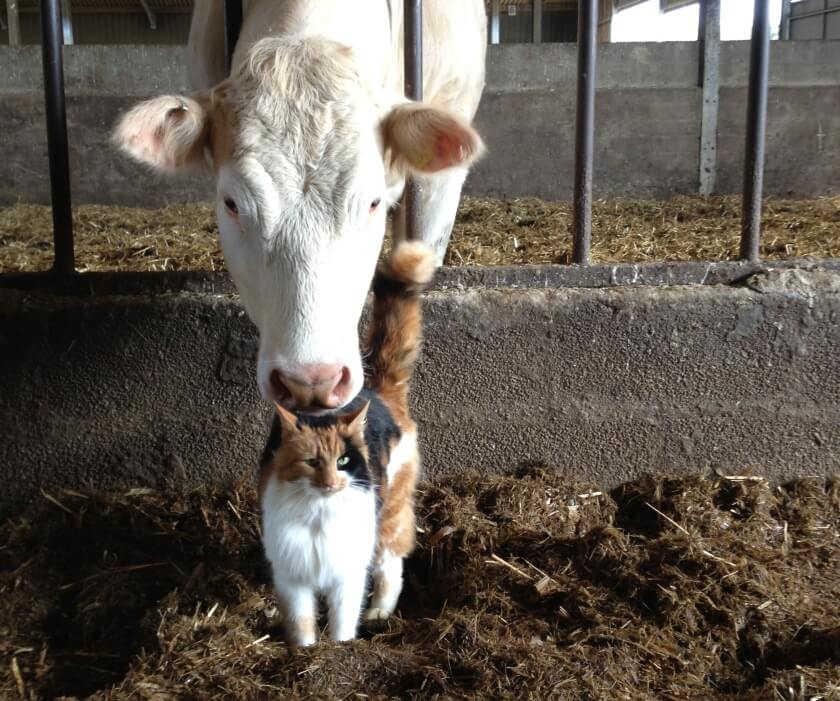Nestle, the world’s largest food company and owner of Nestle Purina PetCare, announced it is adopting animal welfare standards across its entire global supply chain – covering over 90 countries – in what may be the most comprehensive and far-reaching animal welfare policy of its kind.
Cruel industry practices addressed
Nestlé’s program will eliminate from its global supply chain any farm that uses any of the following practices: confinement of sows in gestation crates, calves in veal crates and egg-laying chickens in barren battery cages; the forced rapid growth of chickens used for meat products; and the harsh cutting of the horns, tails and genitals of farm animals without painkillers and animals whose health has been damaged by drugs that promote growth.
Millions of animals will benefit
Nestle has some 7,300 suppliers from whom it buys animal-derived products directly. Each of these suppliers, in turn, buys from others, meaning that Nestlé’s new program will apply to literally hundreds of thousands of farms around the world.
Animal welfare groups applaud
This groundbreaking announcement came today following the signature of a partnership agreement with World Animal Protection earlier this year. Nestlé’s policy follows dialogue with animal protection organizations, including Humane Society International, the Humane Society of the United States, Mercy For Animals and World Animal Protection who applaud Nestlé’s leadership in this major advance in farm animal welfare. Nestlé is the first major food company to form an international partnership with an animal welfare organization.
Remarkable shift in corporate ethics
The guidelines of Nestlé’s new program includes, for example, spacing requirements for the rearing pens of certain species of animals, such as pigs and cows, to ensure they are not cramped and can engage in normal animal behavior. In addition, following the involvement of World Animal Protection, Nestlé’s guidelines also seek to minimize pain for farm animals by using veterinary practices that reduce pain, or avoiding the practices in the first place by different animal husbandry practices. An example would be the dehorning of cows.
Guidelines, codes and commitments
World Animal Protection has been working with Nestlé on how to specifically tighten and improve the Nestlé Responsible Sourcing Guideline , which all suppliers must adhere to as part of the Nestlé Supplier Code . Both of these build upon the Nestlé Commitment on Farm Animal Welfare.
A food industry first
Bundling all of these reforms together, this announcement marks the most comprehensive and ambitious animal welfare program by a global food retailer to date. It builds on the enormous momentum animal welfare organizations have created for moving away from the intensive confinement of animals on factory farms and marks new progress on issues related to the routine mutilation of animals. It also sounds the death knell for selective breeding practices that compromise the health of animals in order to achieve accelerated growth.
Third party verification and audits
Importantly, these programs will be audited by an independent third-party organization. Suppliers’ compliance will be audited by SGS, which specializes in verification. Looking over SGS’s shoulder will be World Animal Protection, an activist group which will carry out checks to ensure the new standards of animal welfare are met on its supplying farms. Some of these checks are also attended, unannounced, by World Animal Protection representatives whose role is to verify the auditors.
Consequences of animal abuse violations
When a violation is identified, Nestlé will work with the supplier to improve the treatment of farm animals to ensure they meet the required standards. If, despite engagement and guidance from Nestlé, the company is unable or unwilling to show improvement, it will no longer supply Nestlé.
A global shift
Not only will the program improve the quality of life for animals in Nestle’s food system, and it is likely to have an impact on other companies that either share the same suppliers or compete with Nestlé. The partnership doesn’t only impact Nestlé, it’s a loud and clear message to all involved in the food industry – the humane treatment of animals should be at the heart of all businesses.
Consumers care about cruelty
Consumers overwhelmingly have made it clear – cruelly confining animals in cages for their entire lives, castrating or removing their tails or horns without painkiller and breeding them in a way that compromises their welfare – is simply unacceptable. Nestlé’s commitment to improving animal welfare will have a lasting change on millions of farm animals around the world.
Note: Purina’s animal feed divisions are not owned by Nestle, and Purina Mills is owned by Land O’ Lakes, and Purina Canada is owned by Cargill, Inc.
Read more about it here
Nestlé announces farm animal welfare commitment
World Animal Protection and Nestle will change animal’s lives
Mercy For Animals Commends Nestle For Sweeping Animal Welfare Changes Following Graphic Undercover Video
Humane Society International on Nestle’s animal welfare program
Humane Society applauds Nestle’s animal welfare reform
Nestlé’s commitments on responsible sourcing
Nestlé and farm animal welfare
Responsible sourcing and the Nestlé Supplier Code


Comments (4) Write a comment